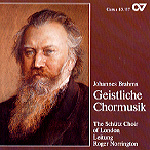These performances originally were recorded by Decca in the 1980s in the justly famed acoustics of London’s Rosslyn Hill Chapel, and although we can fully appreciate the recording’s lucid ensemble detail, along with it comes sound that’s puzzlingly bright and edgy, tending toward glassy harshness in the all-female works. Further, balances in the a cappella works aren’t always true, with individual sections popping into prominence when they shouldn’t (in the Op. 74 motet Warum ist das Licht gegeben, for instance). There’s no question as to this choir’s credentials or its technical facility in rendering these rich-textured, melodically fertile (as we expect from Brahms), often complex-structured works that virtually span the composer’s entire career. However, the disc’s sonic problems prevent us from enjoying the full-bodied dynamic range and careful balances that these pieces deserve.
Conductor Roger Norrington also makes some odd choices, such as the unbelievably plodding tempo and punchy rhythmic style in what should be a lovely, seamlessly flowing legato for Geistliches Lied Op. 30. Of course, the best recording of these works is by the unrivalled Trinity College Choir, Cambridge with Richard Marlow–formerly available on a Conifer CD from 1989. Its perspective places more distance between listener and choir but overall has the advantage of warmer and better balanced sound and a choral quality and ensemble precision that’s rarely equaled. The Corydon Singers (still available on Hyperion) places the performers even farther away–in an even more resonant space–but you can’t complain about the lushness of the vocal sound and the choir’s obvious delight in Brahms’ irresistible choral writing. The Schütz Choir of London certainly isn’t bad–the pieces with organ come off especially well–but the unimpressive sound limits the long-term appeal of this effort.
































